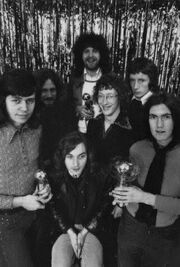
Electric Light Orchestra (ELO)are a British rock group from Birmingham, England, who released eleven studio albums between 1971 and 1986 and another album in 2001. ELO were formed to accommodate Roy Wood and Jeff Lynne's desire to create modern rock and pop songs with classical overtones. After Wood's departure following the band's debut record, Lynne wrote and arranged all of the group's original compositions and produced every album.
Links to Peel[]
According to the liner notes on "ELO II", John Peel was a fan of Jeff Lynne and Roy Wood's work with their previous band, The Move (who had two Top Gear sessions, although not with Lynne in the lineup). Lynne's earlier outfit, the Idle Race, had six Top Gear sessions and Peel was among the DJs pictured on the sleeve of their first album. [1] (Dead Link)
Peel did, in fact, play some of the music from the first ELO records, and there is evidence that he was interested in them at first. On the 22 April 1972 issue of Sounds when he reviewed The Move's final single "California Man", he lamented the fact that the first Electric Light Orchestra LP didn't sell "as well as it should have done" [1].
In the next couple of years he proceeded to give the band positive reviews during the first steps of the project. His review of their first single "10538 Overture", on a 1972 number of Disc & Music Echo was thoroughly positive. He noted that the song was indeed taking off where The Beatles left off and thus, it could have have had a dated sound itself, but he preferred to think of it "as a dormant sound that has been awoken". He noted that he thought the song somehow sounded better as a single than it did as an album track on their eponymous album and stated that both he and his wife liked the song "very much". Although the single was 4 minutes long, he hoped that that fact wouldn't have deterred "folks from playing it on the radio". He also concluded that even though ELO was being influenced by The Beatles, Roy Wood and Jeff Lynne's voices sounded "nothing like the lovable mop-tops" and that "added to the very full sound the orchestra get", they did "sound superb". [2]
In another 1973 issue of Sounds, he reviewed Electric Light Orchestra's version of "Roll Over Beethoven " stating that, although at first he was annoyed by the fact that someone was covering yet another Chuck Berry song, he thought that Electric Light Orchestra's version thundered "along magnificently" and that he "should haven't doubted Jeff Lynne's ability to come up with something remarkable".[3]
In yet another article from the same magazine, he also wrote an enthusiastic review of their non-LP single "Showdown " (later included on the American copies of Electric Light Orchestra's third album "On The Third Day"), writing that even though he didn't rate the song too highly at first hearing, it was "a grower" with an excellent production and a "very black sounding" arrangement. He gave the single 9/10, commenting that Lynne "obviously has been listening to someone pretty good" as an inspiration. [4]
However, as the band gained success and gradually simplified their music, he abandoned them; by the time that Peel embraced punk, he and ELO would have been regarded as inimical.
Lynne was later part of the Traveling Wilburys, who also featured Peel favourite Roy Orbison. The Delgados recorded a cover of the group's 'Mr Blue Sky' for their sixth Peel session, first broadcast on 16 October 2002, which got quite a bit of airplay in Peel's program.
Sessions[]
- none
Other Shows Played[]
(Please add more information if known)
- 1970s
- 22 December 1971: 10538 Overture (LP - The Electric Light Orchestra) Harvest
- 11 January 1972: unknown
- 27 June 1972: 10538 Overture (single) Harvest
- 13 March 1973: From The Sun To The World (Boogie No. 1) (LP – ELO 2) Harvest
- 03 April 1973: In Old England Town (LP – ELO 2) Harvest
- 09 December 1975: Night Rider (LP: Face The Music) Jet
- 25 November 1976: 2 tracks from A New World Record
- 20 January 1978: tracks from Eldorado
Top Of The Pops[]
- 23 June 1983 (TOTP): Rock 'N' Roll Is King
- 07 July 1983 (TOTP): Rock 'N' Roll Is King
Cover Versions[]
- 16 October 2002: Delgados - Mr. Blue Sky (Peel session)
- 26 December 2002: Delgados - Mr. Blue Sky (Peel Session) FF#29
- 18 February 2003: Delgados - Mr. Blue Sky (Peel session) (EP- All You Need Is Hate) Mantra
- 26 October 2004: Delgados - Mr. Blue Sky (Peel session) (tribute show)
(List is incomplete - please add more if known)
See Also[]
External Links[]
- Footnotes
- ↑ Reprinted in the 2005 remastered edition of The Move's "Message from the Country".
- ↑ Reprinted in the 2001 expanded edition of "The Electric Light Orchestra, titled "First Light".
- ↑ Reprinted in the 2003 expended edition of "ELO 2, titled "The Lost Planet"".
- ↑ Reprinted in the 2003 expended edition of "ELO 2, titled "The Lost Planet"".